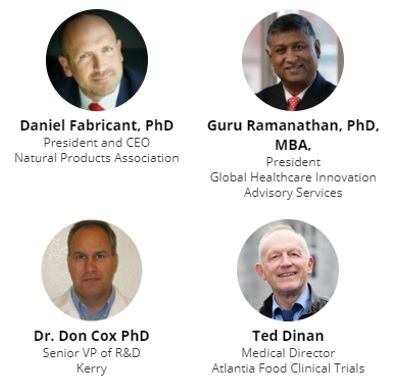Speaking during the webinar, “Immune health clinical research: Building the science to support the claims” panelists discussed a range of topics, from the improvements in clinical research, the challenges with the understanding what a “normal immune system” is, the issue of publishing the data, how to protect your scientific IP, how the coronavirus is disrupting clinical research, and much more.
The panel included:
Daniel Fabricant, PhD, President and CEO, Natural Products Association;
Don Cox, PhD, Senior VP of R&D, Kerry;
Guru Ramanathan, PhD, President of his own global healthcare innovation advisory services company and former Senior Vice President and Chief Innovation Officer for GNC;
Ted Dinan, PhD, Medical Director, Atlantia Food Clinical Trials
The free to attend webinar is available on-demand by clicking HERE, but here are some of the key statements made during the extensive discussion:
Is the quality and quantity of nutrition research improving?
Dr Ramanathan: “Looking back over the years to where we were 20 years ago and where we are as an industry, I think we’ve made tremendous strides. If you think back to the late 90s, the typical substantiation that was used tended to be what was in German Commission E or similar databases. But today, practically every major raw material supplier that are dealing in branded ingredients, and indeed many of the reputable brands that are sold at retail, they have an R&D budget and they invest in research for quality, for safety, and for efficacy.
“The quality of this research has also increased tremendously over the years, and while we still have some more work to do here, I think we’ve come a long way.”
Dr Fabricant: “I echo Guru’s comments. Over a specific period of time, the scientific endeavors ought to increase in an industry. One of the areas where we can do better is for many of the tried and true ingredients like vitamin D. The industry has largely left that up to academia, which isn’t always a bad thing but it’s not always a good thing either.
“We’re very eager as an industry to spend the research dollars on new ingredients where we have our fingerprints on them. I think for some of the more classical nutritional aspects, which are still dietary ingredients and sold in dietary supplements, sometimes we’re not as quick to grab onto industry research because we treat it as a commodity.
“In general, folks when they start their research endeavors they say, 'Let’s design end points around the claims we’re going to make.' That’s not necessarily wrong. For immune health, the science really drives the claims and not the other way around, but you have to be careful,” Dr Fabricant added.
Dr Cox: “Science doesn’t currently have a really good grasp on what is a normal immune response. It differs among individuals and in a study that would be a challenge. Designing studies around immune health claims, something like, ‘supports a normal immune system’ or ‘supports a healthy immune system’, there are challenges.”
Are companies involving the right people at the right time (are some involving regulatory affairs too late in the process, for example)?
Dr Ramanathan: “When it comes to the early stage of the research when we’re trying to establish safety, toxicity, mechanisms of action, and if indeed there is a utility for the innovation, you need the science team, the regulatory teams, the legal teams, and to some extent the product development and quality team as part of the group.
“But when this moves to commercial applications, it becomes important to understand what the customer is looking for and then making sure the product we design and the ingredients we select actually will meet the customers applications. It does become important in these types of conditions to have somebody from market research – the marketing and branding team – to be part of that decision-making process.”
How important is it to publish in peer-review journals? (It’s important to note that not all peer-review is created equal)

Prof Dinan: “We’re seeing an explosion in the number of journals that are out there and that doesn’t necessarily improve quality and standards.”
Dr Cox: “Our strategy [with Wellmune] early on was to do affordable studies. So, we looked at early designs that used clinically validated surveys to collect data rather than doing blood biomarker studies, which are costly.
“But we had plans all along the way via a multi-year plan to get our information out there and to improve and increase the rigor of the studies over time as the business grew and as we could afford to do more costly studies, and doing blood biomarker studies are expensive studies.
“Information on Wellmune has been published in very high-quality journals like Nature, but some of the early studies were published in much lower impact journals, and part of that was simply about what we were capable of doing in those early studies.”
Dr Ramanathan: “This [the question of publishing your science] is always an interesting quandary. Just because it’s published in a big journal doesn’t mean it’s good science.
“What we had always done [while I was at GNC] was that we insisted that the raw data be provided to us and we would analyze it ourselves, and then we would provide it to an outside statistician, and if that due diligence was consistent with the work done by the supplier of the material then we would proceed with launching the product. And the claims we would make were not based on what was necessarily published in the journal but based on what we thought was good and adequate substantiation.”
The majority of clinical studies are on the ingredients and only rarely do we get a study on a finished formulation. Is that an issue?
Dr Ramanathan: “A good majority of the innovation that takes place in our industry takes place at the ingredient level, and so it’s logical that we start with proving the ingredient or combination of ingredients that are safe and efficacious. And for our industry this is already a significant first step. Clearly, we’ve evolved over the past several years, and now many of our studies are using the same outcomes and test as the pharmaceutical industry is using. You could argue whether those are appropriate or not but that is a different discussion, but this is already a significant first step for our industry.
“The next evolution you could argue should be towards finished products, but with so many iterations of so many similar products, that’s a monumental task and do you really need to repeat something over and over again? I think ingredient-level clinical claims can indeed be used in finished products, as long as there is a reasonable scientific basis to expect that they will perform equally well in the finished product and not have a diminished product or be potentiated in any way that could trigger an unexpected reaction.”
Protecting your science and the issue of others piggybacking on your research
Dr Fabricant: “There are lots of solutions and it is a big problem. There’s always a drive by the science side of an organization to publish. I think you’re seeing more and more scientists – and I know Guru and I have had this discussion over many years – if you have great research on a new ingredient, don’t you dare publish unless you want people to do exactly that [piggy backing on your science].
“Not having your IP team involved right from the start of your clinical trial on what they can get PTO [the US Patent and Trademark Office] to sign off on, and what they cannot get PTO to sign off on, I think is a big part. You may not get strong protection on an ingredient patent, but you may get stronger protection on usage of that material or combination of materials, or the claims, and not having that spelled out from the beginning you do open yourself up to getting ripped off.”
How is the coronavirus impacting clinical research and clinical research organizations?
Prof Dinan: “It’s a big challenge to any company in this particular environment. We really drew most of our trials to a close when the coronavirus hit. We’re not due to open the Cork facility until June 29th. In order to get running again, we’ve had to change the layout of our facility, we’ve installed thermal cameras to monitor staff and participants on a regular basis. We’re trying to do more video calls and phone calls.
“There are many aspects of clinical trials that we’ve done face to face in the past, that we’ve realized can be done with video link up, and we’ll do more of that as we move forward.
“We’ll probably have less face to face interaction moving forward.”


